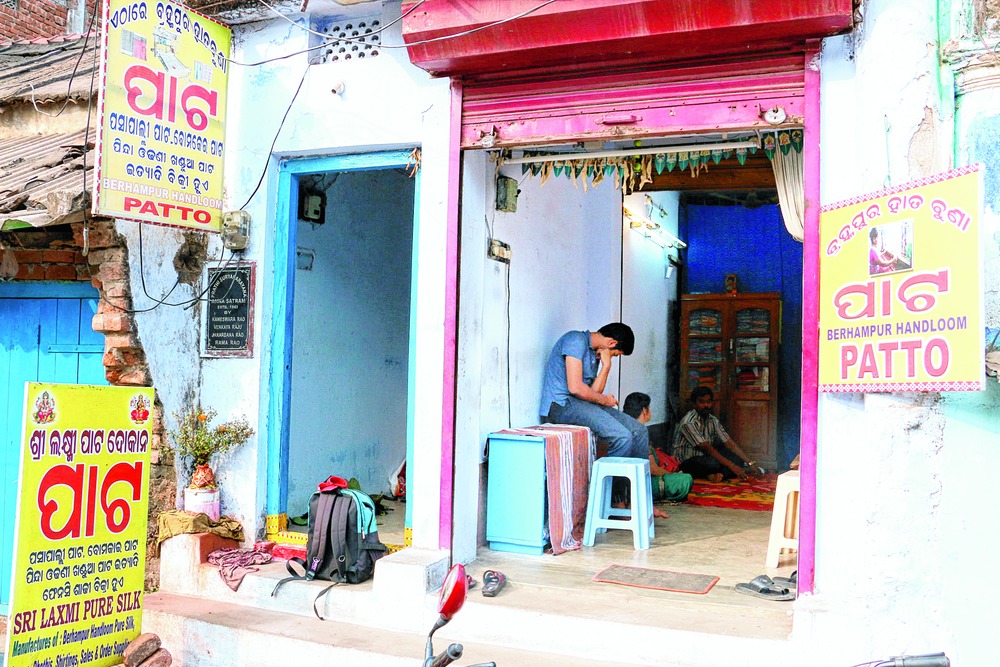
Berhampur, Dec. 23: This time of the year, Kalipu Shankar Rao would ideally be working on his loom all day to meet orders for delivery. But the Narendra Modi government's decision to demonetise higher value currency notes, has put his livelihood at stake.
The 45-year-old has been in the weaving business, which has been the main source of livelihood for his family, for nearly 35 years. But like bolt from the blue, the note-ban move has pushed the 200-year-old Berhampur silk industry, which was already on a steady decline, into a major crisis.
"Both production and sale of traditional silk patta (a kind of sari) have been hit. We are facing difficulty in paying the weavers for converting the yarn into finished products to the tune of lakhs. Most weavers are reluctant to go cashless," said Berhampur Silk Weavers' Co-operative Society president K. Bhima Raju.
He said the Rs 24,000 weekly withdrawal limit was also a headache.
"I have no bank account. My wife and I weave on the loom for livelihood. We live in a rented house with my mother and two school-going children," Rao said.
Rao said he had no time to open a bank account as it required two people to run the loom and he couldn't afford to stop it even for a while.
"Three members of a weaver family work eight hours a day and earn between Rs 4,000 and Rs 6,000 a month," said Bhima Raju.
He said many weavers were not interested in weaving traditional silk saris as the conversion charges were paid by cheque, bringing down production significantly. Moreover, the sales had also dipped in the absence of point of sale (PoS) devices.
The production and sale of the society, consisting of 40 weavers, have reduced by 50 per cent, Bhima Raju said.
The cost of a Berhampuri patta now ranges between Rs 4,000 and Rs 6,500.
Official sources said the production and sales figures of the Berhampur Cotton and Silk Weavers Co-operative Society was Rs 24.52 lakh and Rs 21.56 lakh, respectively, between April and November. For the same period, the figures for Chowdeswara Silk Weavers' Co-operative Society was Rs 42.86 lakh and Rs 38.21 lakh and that of the Berhampur Silk Weavers' Co-operative Society Rs 26.84 lakh and 18.33 lakh. The details of production and sales after demonetisation is still being prepared, sources said.
Berhampur Cotton and Silk Weavers' Co-operative Society secretary J. Prakash Rao said they paid Rs 1,716 as conversion charges for each silk joda.
"We have to pay at least five workers a day. It would be easier if the maximum weekly withdrawal limit was increased to Rs 50,000," he said.
The societies are still hopeful that the present cash crunch will not hurt the economy too much. The peak season for the sale of patta is between February and June, when most marriages take place, and they are hoping to turn a profit during that time.
However, Utpal Ghose, the assistant director (textiles) for Berhampur, said the weavers must opt for cashless transaction.
"I have already discussed the matter with officials and members of the three societies. Online payment is much better and I have asked all the weavers to open bank accounts and withdraw money through debit cards," Ghose said.
Chowdeswara Silk Weavers' Co-operative Society president B. Chandra Sekhar said: "We need a special legislation that will have provisions for family pensions and other social security measures and government patronage in marketing in India and abroad for the industry to survive."
Some weavers have, however, agreed to go online payment for death claims under the Mahatma Gandhi Bunakar Bima Yojana, which is linked to the Life Insurance Corporation and free of cost and some other schemes. They must come forward to adopt the cashless system, Ghose said.










